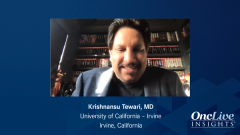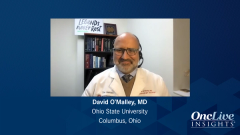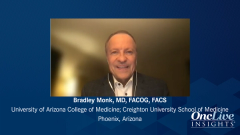
Endometrial Carcinoma: Clinical Case Scenario 2
Experts explain the need for germline testing and genetic counseling for patients with endometrial carcinoma as demonstrated by a patient case.
Episodes in this series

Krishnansu Tewari, MD: David, let’s hear about your patient.
David O’Malley, MD: Actually, I think Brad has the next case.
Bradley Monk, MD, FACOG, FACS: I have the pleasure of working here in Arizona where there’s a very large Native American population. It’s my pleasure to take care of them and collaborate closely with the Indian Health Service. Obesity is a serious problem there. We’ve learned and we’ve already addressed that how these patients are treated depends on the type of provider. This idea that they need chemotherapy as an adjuvant treatment is important, but sometimes the patient will see someone who may not be as familiar and say, “We’ve given radiation forever.” This particular patient has 3 positive nodes and needs systemic therapy. If you want to give vaginal brachytherapy, that’s fine. We already talked about the negative GOG-258 trial in the New England Journal of Medicine, presented by Daniela Matei, MD, which showed that adding radiation to systemic therapy did not improve survival.
This woman got radiation, and I didn’t treat her. Since it was done outside of a high-volume center, this center did not have the molecular testing. We had realized that and were trying to work through the state. I want to ask Krish, you, or Dave, when you do mismatch repair deficiency testing, when do you do germline to look for Lynch syndrome [hereditary nonpolyposis colorectal cancer]?
Krishnansu Tewari, MD: If they have loss of any of these proteins, as long as it’s not MLH1,or it is MLH1 and promoter hypomethylation has been ruled out, we send them for genetic counseling and we get them tested for Lynch syndrome.
Bradley Monk, MD, FACOG, FACS: Do you send them to a counselor, or do you counsel them at the point of contact in your clinic?
Krishnansu Tewari, MD: It depends on where I am. At UCI [University of California, Irvine], we counsel them, and we order the tests ourselves. At one of our other sites, we have an organized genetics program that sees the patient the same day in our office, and they get counseled right there.
Bradley Monk, MD, FACOG, FACS: You begin to develop 2 groups of patients who are MSI [microsatellite instability]-high or mismatch repair deficient. One group is a promotor hypomethylation, MLH1 generally, so that’s epigenetic silencing or epigenetic loss. The other group can have a mutated gene that can either be somatic or germline. I think we’re learning, Dave, that those sorts of subsets are different. Tell us about how that group of patients would respond differently.
David O’Malley, MD: We’ve learned a lot from the colorectal data, and I think as we look at the mutated gene group, clearly those are benefiting the most. We need to better describe those patients and further refine our testing, but again, we continue to do that. We have some research that is just coming out and is now accepted for publication. This research calls into question the thought that we should only send certain patients who have loss of one of the mismatch repair proteins to get genetic testing. We are identifying another potential 10% to 15% of patients with genetic predispositions beyond even Lynch syndrome, particularly in our high-risk type of uterine cancer. At the current time, I’m still going to treat patients with hypomethylated versus genetic abnormalities with a single-agent PD-1 inhibitor, but I think we need to answer that question more clearly. What do you guys think?
Bradley Monk, MD, FACOG, FACS: Germline testing is becoming so cheap and so prevalent; it’s just easy. To talk yourself out of it when a woman has cancer, particularly at a young age–I hear you. To your point, Krish, you can counsel those patients right at the point of care, and patients want to know what their germline testing shows. I think that’s evolving.
Transcript edited for clarity.







































